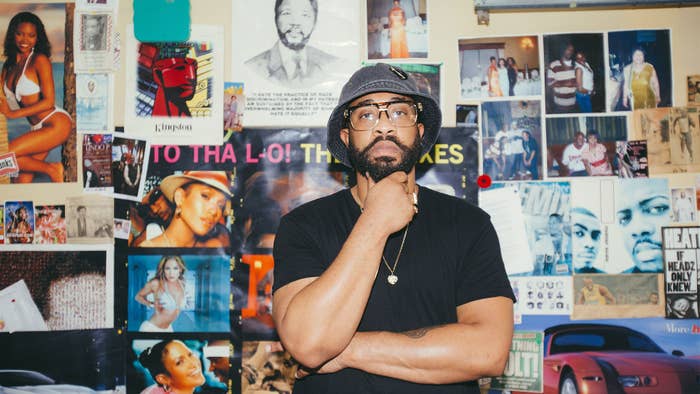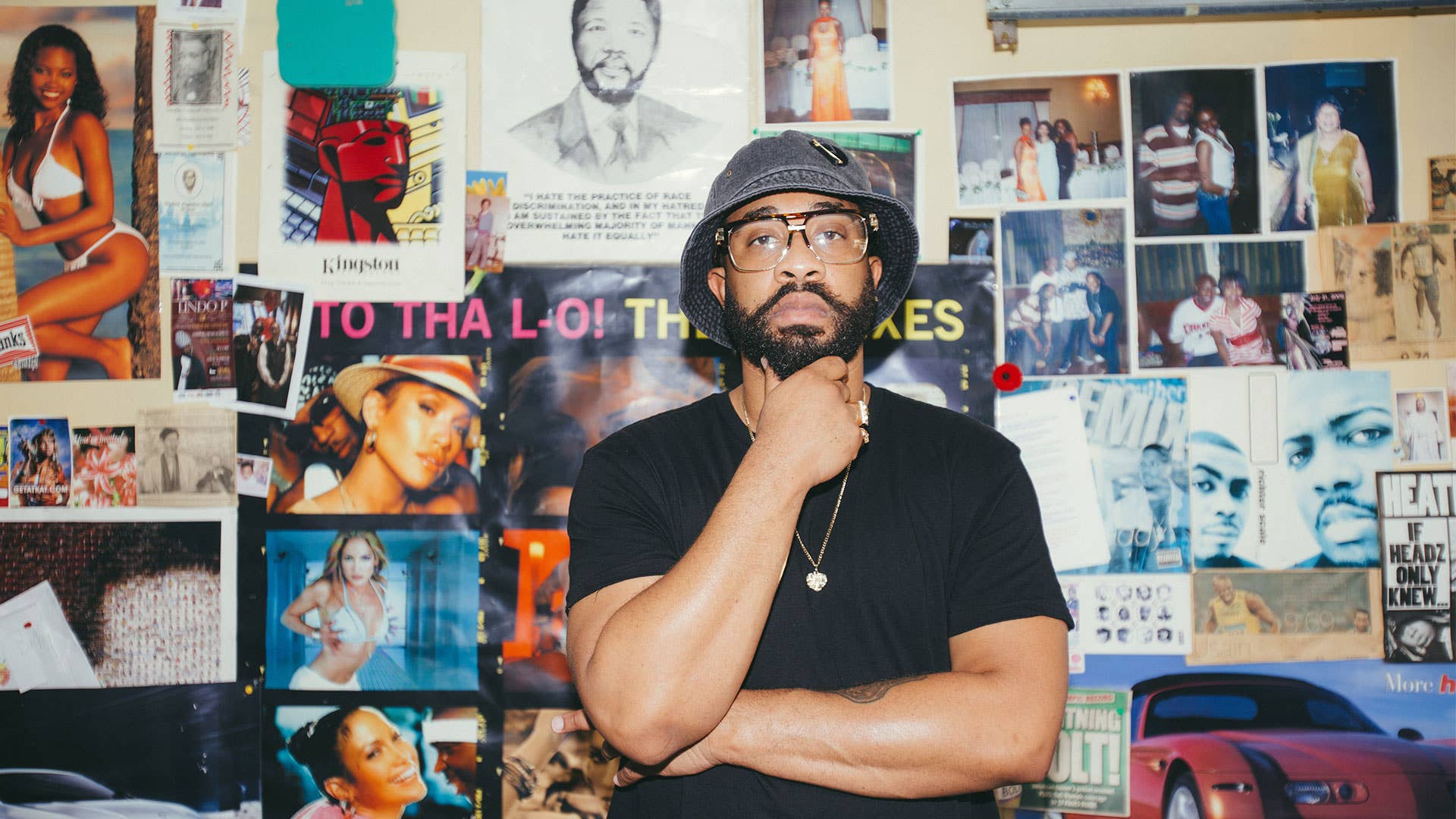
Tona is arguably one of Toronto hip-hop’s most consistent, versatile, and underrated MCs. Ever since he turned heads with the innovative beep-infused single “Dial Tone” back in 2007, the Scarborough MC has made his presence known through his distinctive baritone voice on a dizzying number of projects. As a solo artist, Tona has been remarkably consistent dropping albums like Silverspring Crescent, Carpe Diem, Ivy League, and 2018’s Black Mirror, not to mention his EP and mixtape releases like Direct Deposit (with producer Lyve), Reform School, and Don’t Holla. Additionally, he’s been a key team player, contributing rhymes to Toronto’s politically-oriented Freedom Writers crew for their albums Now and Again. His full-length project with another collective, Naturally Born Strangers, which also featured producer/MC Rich Kidd and MC Adam Bomb, led to a 2015 win at the Junos for Best Rap Recording.
However, Tona is not showing any signs of letting up and in 2020, he’s just released his new album July 26th, showing that his energy, creative approach, and work ethic show no sign of abating despite his deep catalog and experience. Tona talked to Complex about his new release.
When I first heard about this album, I thought that it was coming out on July 26.
Yeah, everybody did. Honestly man, and I tried my best to separate the date to keep people informed about that shit. But people already had it embedded in their mind, like July 26 is the date when it's dropping too. So I just like that. Now it's time to start putting out the alerts.
So what is the significance of the date?
So, the July 26, [that's] my actual birthday. The main reason why I put that as the date is because a lot of not only the content, but everything that I do musically is centred around that—whenever July comes around, that's a national holiday for us. And when I say us, it's like, I got a twin brother and I got a cousin, we all share that birthday together. And a couple of homies, too, so it's like, yo, it's always been significant for me. It's the end of the summer for me. The mood changes. It's like that pivotal point of the year where shit just turns around.... Every day is gonna feel like that from now on because I stepped away last year. I kind of just stepped away from music because I just needed to recalibrate my mind and shit, and get passionate [again] about why I even started music in the first place, because I was starting to lose that. While I was doing that, I was just consistently finding ways to evolve, man, and I was like, 'If it ever gets to a point where I'm saying I'm not having fun, that's when I'm going to fall back.' I just prided myself in finding that new energy. Treat that shit like July, you know what I'm saying? Every track on there is like a celebration for me.
The album starts with “Deals,” which doesn’t sound like a typical intro track from you.
So the main reason I put that there is because it's not expected. Everyone, even down to producers, whenever they send me beats, they're already assuming like, yo, I want to just rap fast, you know what I mean? They send me all their like boom bap shit. They won't send me their folder—like their abstract, unquantized drums and shit. And that's the kind of shit that I like, you know? But in their mind, their mentality, that's what they've heard from me. And some of them, you know, haven't been able to follow me for, like each album. And if you do that, you can actually see the progression, not only sonically, even the substance; it's getting a little bit different. It's like, yo, I won't talk about me being on that block anymore, because I'm not there. But I will still tell you; you'll still get portrayals of it because I was actually out there. And then it's just different—your mentality and the growth and like, everything changes and evolves, man. So it's like, I wanted to give you the unexpected this time.
"Most people don’t find enlightenment in this lifetime, bro. If they do it comes in the form of jail or getting shot or some shit."
Aside from what you said conceptually about that, you know, it being a celebration, I mean, what connects these tracks for you?
I mean, what connects them is like, the time. I remember each one of these moments. For example, a song like “Everything is Golden.” What happened there was cousin, he [died by] suicide, right? It was a moment in my life where I was trying to capture that feeling. That vulnerability that I show sometimes, like, on certain songs, I wasn't able to do that before because, I didn’t want to, I was hesitant to let people in that much. I found strength in that vulnerability. Now, I’m like, yo, there's someone else going through this shit. Those are the people that are usually in my inbox telling me like, yo, like, that song might not be like that single that you push out, but that's the one I connect with the most. So now that I started writing like that, I go and let go of that like, little skepticism, writing songs like that. For me, that's a moment that's captured now. That's archived, however you feel about the song, like I'm glad I get to leave something like that behind.
Obviously, I know that you are from Toronto, but you have roots in Ghana and then you're kind of checking people in, obviously, the UK. “Links” is a track that makes those connections visible. How important is it to talk about those kinds of things?
It's important to me, man, because like, again, I have some deep-rooted lineage everywhere. In certain parts of obviously Africa, you know, Toronto, and I'm saying UK, so I embrace all of those at all times. The only place I haven't been toyet is Africa, but I've been everywhere else. That first time I went to the UK, I only [intended to go] for like, a week and a half, and because there's so many global parallels that are similar to Toronto, I ended up changing my flight, like, three times. I ended up staying for close to a month. I'm like, 'Yo, this feels like home, but in a different way, man. Yo, the way people are talking in certain areas, the culture, you know, there's mad similarities.' I think that trip was when I found out about grime, too. And I was like, 'Yo, they got their own genre of music and shit, but that's like, poppin! I'm staying for this.'
I listened to the first Freedom Writers album on the weekend for the first time in a long while and it seems even more relevant right now. I mean, I don't know if you guys have had any conversations since everything started happening [since the death of George Floyd], but this could have come out today.
Exactly. I mean, we were all speaking about that the other day, because the main reason we formed that collective, man, is because everybody that's a part of it is already socially conscious. They’re actually working in their communities. The work is not for notoriety. So we won't promote it on social media. We'll just do the work and contend with the fact that, yo, we make a difference by just laying a brick down in the foundation of the community diaspora, man. Because again, usually [it's] the people with the most relatable experience that don't get heard from when it comes to city planning, anyway. So we did that and all of the issues that we were talking about were at the back of the news cycle—like, we knew it was there, but we know that perpetuating violence and poverty and wealth are the things that are usually at the front. So it's like yeah, we always knew it was there. Police brutality has been there. It's just, like, these are things you just wanted to speak about to help bring that shit to the front, to kind of give it some light, you know? So that's always been the deal. And it's like you said, the content, it’s the same substance. It's actually unfortunate that the conversation hasn't changed since those albums. That’s a problem. The responsiveness has been fucked up. But not nowadays.
Yeah, I mean, even listening to that Freedom Writers album, on “Off the Pig," you've got a whole verse about being profiled and pulled over. And on SilverSpring Crescent you had “Blue Shield.” I mean, this is not new to you, in your songs.
Exactly. It's like, again, bro. It's not out of glorifying it, but it's having the mindfulness to say, 'Yo, that's how I was feeling at the time and I needed to put that on record.' Because that shit was actually therapeutic, after I got it out. Because I was done, that's how I unpack. I use music as that outlet. I always say, therapy's probably the most valuable thing that people find invaluable. They don't know it, because they're probably internalizing all that shit. I don't want the internalizing, because what that looks like is your next encounter is gonna be mad combative. So it's like, no, find a way to project that energy in a different way, showing the youth that are close to you on the exact same path. Most people don’t find enlightenment in this lifetime, bro. If they do it comes in the form of jail or getting shot or some shit. It doesn’t find everybody in this lifetime.
Toronto's hip-hop scene has become more prominent since you started. You have a track on this album,“No Grudges.” That's one where you say people haven't really given you respect. I mean, where do you see yourself in this history of Toronto hip-hop, in terms of what you’ve contributed?
I had like, gotten mixed emotions for a lot of these projects in the city, because usually when I travel a lot, like when I go into another city, people will be like, 'Oh, it's the best shit I ever heard,' but Toronto will make you think your shit ain’t good enough. It doesn't always make you feel like you're the worst, but like, when you go out? It's like those people found diamonds. So I had that emotion, but now I'm just contributing to the music community out here in different ways. Not only from the music standpoint; I'm contributing from different angles right now. Before I was working with the Toronto Arts Foundation and Toronto Arts Council and so, I found different ways to tap into the community.
As much as people look at me as, like, one of the staples out here, I'm still solidifying my spot. I want it to be on the same level as the way Kardinal is revered, you know? I mean, I'm not gonna sit here and act like that status here is not important to me. Because, you know, end of the day, I do want my shit to be time capsuled and bolted with my contribution to the scene, you know what I'm saying? I let go of trying to be the illest rapper out here; someone else can have that. I’m talking about my contribution sonically and the way my songs are, and obviously you're not gonna outhustle me—like, that's not gonna happen. I’m doing it in different ways now, man. I want to contribute as much as I possibly can, just musically adding to the catalog of our city and pushing that movement forward.



